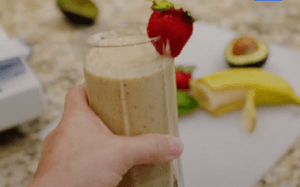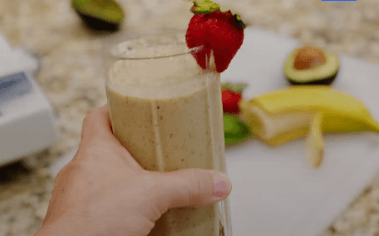Muscle recovery is a crucial part of fitness and athletic performance. Proper nutrition, particularly through a well-balanced smoothie recipe for muscle recovery, can significantly enhance your recovery process. This guide covers everything you need to know about creating and consuming the best recovery smoothies.
Importance of Muscle Recovery
Muscle recovery is essential for rebuilding and strengthening muscle tissues after exercise. Without adequate recovery, muscles may remain fatigued, increasing the risk of injury and delaying progress.
- Recovery allows for muscle repair and growth, optimizing fitness outcomes.
- Proper recovery reduces soreness and prepares your body for your next workout.
- Ensuring muscle recovery improves overall endurance and athletic performance.
Tip: Incorporating a smoothie recipe for muscle recovery into your routine provides the nutrients your body needs for effective recovery.
Benefits of Smoothies for Muscle Recovery
Smoothies are an excellent choice for recovery nutrition. Their versatility and nutrient density make them ideal for replenishing your body post-exercise.
- Quick absorption: Blended foods are easier to digest, ensuring nutrients reach your muscles faster.
- Customizable nutrition: Smoothies can be tailored to include a balance of proteins, carbohydrates, and healthy fats.
- Convenience: They’re portable and can be consumed immediately after a workout.
Including a carefully designed smoothie recipe for muscle recovery in your diet helps meet specific post-workout nutritional needs.
Key Ingredients for Best Muscle Recovery Smoothies
The right combination of ingredients is key to an effective recovery smoothie. Focus on these components for the best results:
Protein Options
Protein is the foundation for muscle repair. Include high-quality protein sources to rebuild damaged muscle fibers.
- Whey protein: A complete protein that’s fast-digesting and ideal for post-workout.
- Plant-based protein: Options like pea, rice, or hemp protein are excellent for those on vegan diets.
- Greek yogurt: Rich in protein and probiotics to support digestion.
Adding sufficient protein to your smoothie recipe for muscle recovery ensures effective muscle repair and growth.
Carbohydrate Choices
Carbohydrates replenish glycogen stores depleted during exercise. Pair protein with carbs for optimal recovery.
- Bananas: High in natural sugars and potassium, aiding muscle function.
- Oats: Provide a slow-release energy source.
- Berries: Rich in antioxidants to combat exercise-induced oxidative stress.
The inclusion of carbs in your smoothie recipe for muscle recovery boosts energy levels and enhances recovery.
Healthy Fats
Healthy fats support hormonal balance and reduce inflammation, both critical for recovery.
- Avocado: A creamy source of monounsaturated fats.
- Nut butters: Packed with essential fats and flavor.
- Chia seeds: Provide omega-3s and fiber for sustained energy.
Balancing fats in your smoothie recipe for muscle recovery aids overall recovery while adding a satisfying texture.
Essential Vitamins and Minerals
Vitamins and minerals play a vital role in recovery by reducing inflammation and replenishing lost electrolytes.
- Vitamin C: Found in oranges or kiwi, it supports collagen synthesis and immunity.
- Magnesium: Present in spinach or almonds, it helps relax muscles and reduces cramps.
- Potassium: Critical for electrolyte balance, found in bananas or coconut water.
Enhancing your smoothie recipe for muscle recovery with these nutrients promotes faster recovery and improved muscle function.
Top Smoothie Add-Ins for Recovery
Boost your recovery smoothies with these add-ins to amplify benefits:
- Turmeric: Contains curcumin, a potent anti-inflammatory compound.
- Collagen peptides: Support joint health and connective tissue repair.
- Spirulina: A nutrient-dense algae loaded with protein and antioxidants.
- Cinnamon: Regulates blood sugar and reduces inflammation.
Experiment with these additions to elevate your smoothie recipe for muscle recovery.
Smoothie Recipe for Muscle Recovery
Here’s a perfect smoothie recipe for muscle recovery to try:
Ingredients:
- 1 scoop whey or plant-based protein powder
- 1 medium banana
- 1/2 cup frozen berries
- 1 cup almond milk (or other preferred milk)
- 1 tablespoon almond butter
- 1/2 teaspoon turmeric
- 1 teaspoon chia seeds
- Ice as needed
INSTUCTION:

- Combine all ingredients in a blender.
- Blend until smooth and creamy.
- Serve immediately for maximum freshness and benefits.
This simple yet nutrient-packed smoothie recipe for muscle recovery provides everything your body needs after a tough workout.
>>Discover More Delicious Recipes<<
For more ideas, explore the following related recipes:
- If you’re looking for a nutritious post-workout snack, try this Pumpkin Banana Loaf, which combines potassium-rich bananas with the earthy flavors of pumpkin.
- Looking for a unique twist on traditional treats? These Earl Grey Cookies offer a delightful blend of tea and sweetness.
- For a crowd-pleasing snack, don’t miss these Muddy Buddies, perfect for sharing after a group workout.
When to Consume Muscle Recovery Smoothies
Timing is crucial when it comes to recovery nutrition.
- Post-workout window: Consume your smoothie within 30–60 minutes after exercise to maximize nutrient absorption.
- Pre-bed recovery: For late-night workouts, a smoothie with slow-digesting proteins like casein can aid overnight muscle repair.
Planning the timing of your smoothie for muscle recovery ensures you make the most of its benefits.
Common Mistakes in Recovery Nutrition
Avoid these common pitfalls when crafting recovery smoothies:
- Neglecting protein: Insufficient protein slows down muscle repair.
- Skipping carbs: Carbs are essential for glycogen replenishment.
- Overloading on sugar: Choose natural sweeteners like fruits instead of processed sugars.
Being mindful of these errors ensures your smoothie for muscle recovery supports your fitness goals.
Adjusting Smoothies for Different Goals
You can modify your smoothies based on your specific fitness objectives:
- Muscle gain: Increase protein content and include calorie-dense ingredients like nut butter or oats.
- Weight loss: Opt for lower-calorie ingredients such as spinach and berries while maintaining protein levels.
- Endurance training: Add extra carbs like honey or dates for sustained energy.
Tailoring your smoothie recipe for muscle recovery makes it versatile and goal-oriented.
The Role of Lifestyle in Recovery
Nutrition isn’t the only factor in recovery; your lifestyle choices also play a significant role.
- Sleep: Aim for 7–9 hours of quality sleep to support muscle repair.
- Hydration: Stay hydrated to optimize nutrient transport and muscle function.
- Stress management: Chronic stress can hinder recovery, so practice relaxation techniques.
Combining a well-crafted smoothie recipe for muscle recovery with healthy habits ensures comprehensive recovery.
Research-Backed Tips for Optimal Recovery
Scientific insights can further enhance your recovery strategy:
- Leucine-rich proteins: Studies show that leucine stimulates muscle protein synthesis.
- Antioxidants: Foods rich in antioxidants like berries reduce oxidative stress from exercise.
- Balanced ratios: A 3:1 or 4:1 carbohydrate-to-protein ratio is recommended for post-workout recovery.
Incorporating these tips into your smoothie recipe for muscle recovery ensures evidence-based results.
Crafting the perfect smoothie recipe for muscle recovery doesn’t have to be complicated. By understanding the importance of key ingredients, proper timing, and lifestyle factors, you can optimize your recovery process and achieve your fitness goals effectively.
FAQs
Are smoothies good for muscle recovery?
Yes, smoothies are excellent for muscle recovery. They are quick to prepare, easy to digest, and can be customized with the right balance of proteins, carbohydrates, and healthy fats. This combination helps repair muscle fibers, replenish glycogen stores, and reduce inflammation after exercise. Including antioxidant-rich fruits and vegetables further aids in reducing muscle soreness and oxidative stress. Smoothies also provide hydration, which is critical for recovery.
Learn more about how smoothies support recovery: Smoothie Benefits for Muscle Recovery.
What smoothies are good for sore muscles?
Smoothies that focus on anti-inflammatory and nutrient-dense ingredients are ideal for sore muscles. For instance:
- Berry and Spinach Smoothie: Berries are high in antioxidants, and spinach provides magnesium for muscle relaxation.
- Turmeric and Ginger Smoothie: These spices have powerful anti-inflammatory properties that alleviate soreness.
- Banana and Cherry Smoothie: Bananas provide potassium, and cherries are known to reduce inflammation and muscle pain.
Find more recovery smoothie recipes here: Smoothies for Sore Muscles.
What is a good smoothie to drink after a workout?
A great post-workout smoothie combines protein, carbs, and healthy fats. For example:
- Post-Workout Power Smoothie:
- 1 scoop whey protein powder
- 1 banana (carbs and potassium)
- 1 tablespoon almond butter (healthy fats)
- 1/2 cup Greek yogurt (protein)
- 1 cup unsweetened almond milk
This smoothie helps repair muscles, replenish energy, and support recovery.
Check out more post-workout smoothies: Best Smoothie Recipes for After Exercise
What is the healthiest thing to put in a smoothie?
The healthiest smoothie ingredients are nutrient-dense and free from added sugars. Some top choices include:
- Leafy greens: Spinach or kale for vitamins and minerals.
- Berries: High in antioxidants and low in sugar.
- Chia seeds or flaxseeds: Provide omega-3 fatty acids and fiber.
- Greek yogurt: Offers protein and probiotics for digestion.
- Almond butter: Adds healthy fats and protein.
Avoid sugary syrups and processed additives to keep your smoothie healthy.
Discover more about healthy smoothie ingredients: The Healthiest Smoothie Add-Ins.
Conclusion
Smoothies are a powerful tool for muscle recovery, offering a convenient, customizable, and nutrient-dense way to replenish your body after exercise. By incorporating proteins, carbohydrates, healthy fats, and essential vitamins and minerals, you can create the perfect blend to repair muscles, reduce soreness, and enhance overall recovery. Adding anti-inflammatory ingredients like turmeric or antioxidant-rich fruits further supports your post-workout needs.
Timing your smoothie consumption, avoiding common nutritional mistakes, and adjusting recipes to fit your fitness goals are key to maximizing their benefits. Paired with a balanced lifestyle that includes proper hydration, quality sleep, and stress management, a well-crafted smoothie recipe for muscle recovery can be an essential part of your fitness routine.
Experiment with different ingredients, stick to nutrient-rich choices, and make smoothies a regular part of your recovery plan to optimize your performance and well-being.
